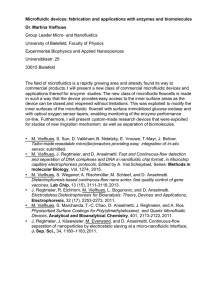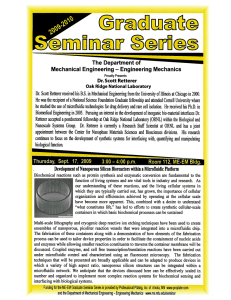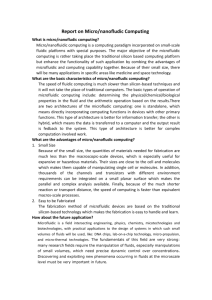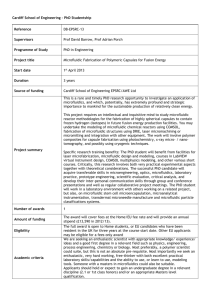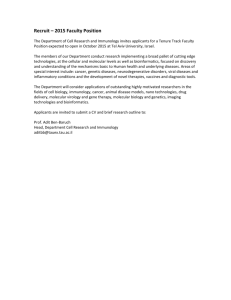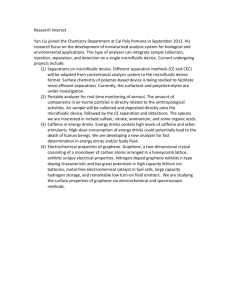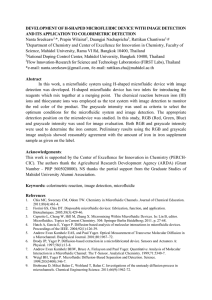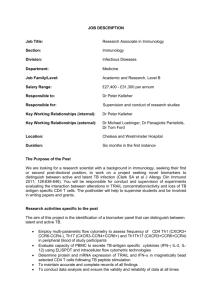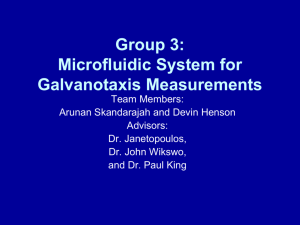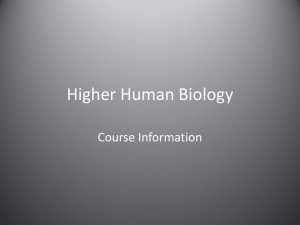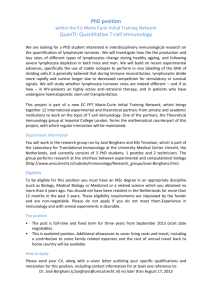Imperial College of Science, Technology and Medicine
advertisement
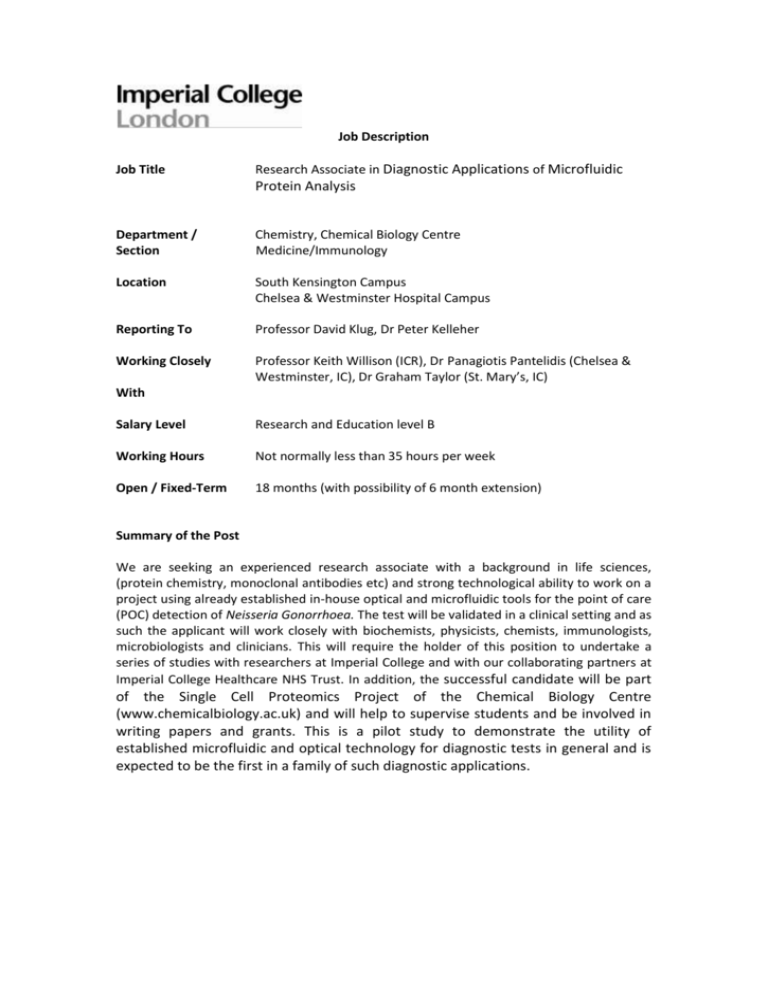
Job Description Job Title Research Associate in Diagnostic Applications of Microfluidic Protein Analysis Department / Section Chemistry, Chemical Biology Centre Medicine/Immunology Location South Kensington Campus Chelsea & Westminster Hospital Campus Reporting To Professor David Klug, Dr Peter Kelleher Working Closely Professor Keith Willison (ICR), Dr Panagiotis Pantelidis (Chelsea & Westminster, IC), Dr Graham Taylor (St. Mary’s, IC) With Salary Level Research and Education level B Working Hours Not normally less than 35 hours per week Open / Fixed-Term 18 months (with possibility of 6 month extension) Summary of the Post We are seeking an experienced research associate with a background in life sciences, (protein chemistry, monoclonal antibodies etc) and strong technological ability to work on a project using already established in-house optical and microfluidic tools for the point of care (POC) detection of Neisseria Gonorrhoea. The test will be validated in a clinical setting and as such the applicant will work closely with biochemists, physicists, chemists, immunologists, microbiologists and clinicians. This will require the holder of this position to undertake a series of studies with researchers at Imperial College and with our collaborating partners at Imperial College Healthcare NHS Trust. In addition, the successful candidate will be part of the Single Cell Proteomics Project of the Chemical Biology Centre (www.chemicalbiology.ac.uk) and will help to supervise students and be involved in writing papers and grants. This is a pilot study to demonstrate the utility of established microfluidic and optical technology for diagnostic tests in general and is expected to be the first in a family of such diagnostic applications. Research Duties The aim of this project is the identification and clinical validation of highly specific monoclonal antibodies that can be applied on our existing microfluidics platform for POC detection of Neisseria Gonorrhoea. As such, expected research activities will include: - Testing of chosen antibodies on microfluidic chips testing of samples spiked with N G protein on microfluidic chips Development of diagnostic protocols Measurement of NG clinical samples on microfluidic chips to take initiatives in the planning of research to work as part of the team to identify and develop suitable techniques, and apparatus, for the collection and analysis of data to conduct data analysis to ensure the validity and reliability of data at all times to maintain accurate and complete records of all findings to write reports for submission to research sponsors to present findings to colleagues and at conferences to submit publications to refereed journals to provide guidance to staff and students to attend relevant workshops and conferences as necessary to develop contacts and research collaborations within the College and the wider community to promote the reputation of the Group, the Department and the College Other Duties - - to undertake appropriate administration tasks to attend relevant meetings to comply with relevant College policies, including Financial Regulations, Equal Opportunities Policy, Promoting Race Equality Policy, Health and Safety Policy, Information Systems Security Policy and Intellectual Property Rights and Register of Interests Policies to undertake any necessary training and/or development any other duties commensurate with the grade of the post as directed by line manager / supervisor Imperial College London is committed to equality of opportunity and to eliminating discrimination. All employees are expected to adhere to the principals set out in its Equal Opportunities in Employment Policy, Promoting Race Equality Policy and Disability Policy and all other relevant guidance/practice frameworks. Since job descriptions cannot be exhaustive, the post holder may be required to undertake other duties that are broadly in line with the above major activities and key responsibilities. Person Specification Research Associate in Microfluidic Protein Analysis for Job Title Diagnostic Applications Department / Section Chemistry, Chemical Biology Centre Medicine/Immunology, Location South Kensington Campus Chelsea & Westminster Hospital Campus Qualifications PhD in life sciences, chemical biology, biochemistry, immunology or a closely related discipline or equivalent research, industrial or commercial experience. Knowledge / Experience - - A background in at least one of the following areas is required: chemical biology, biology, or immunology Proven ability in more than one of the following areas: , handling and processing patient samples, cellular and molecular assays, protein chemistry and monoclonal antibodies Experience with multidisciplinary research and practical experience of working as part of a research team. Experience of undertaking proof-of-concept studies and collaborative experiments Maintain accurate and complete records of all findings Experience of producing biological and biomedically relevant data Skills and Abilities - Ability to work as part of a multidisciplinary team ability to conduct a detailed review of recent literature ability to develop and apply new concepts creative approach to problem-solving excellent verbal communication skills and the ability to deal with a wide range of people excellent written communication skills and the ability to write clearly and succinctly for publication ability to direct the work of a small research team and motivate others to produce a high standard of work ability to organise own work with minimal supervision ability to prioritise own work in response to deadlines advanced computer skills, including word-processing, spreadsheets and the Internet ability to work to deadlines Personal Attributes - Interest in multidisciplinary research Interest in the application of physical techniques to the solution of biological problems Interest in biological problems Willingness to work as part of a team and to be open-minded and cooperative flexible attitude towards work discipline and regard for confidentiality and security at all times willingness to undertake any necessary training for the role willingness to travel both within the United Kingdom and abroad to conduct research and attend conferences
